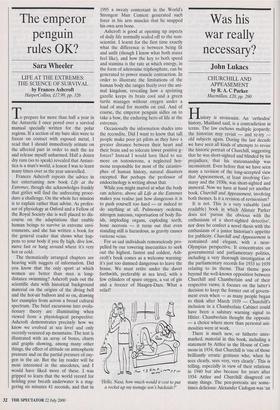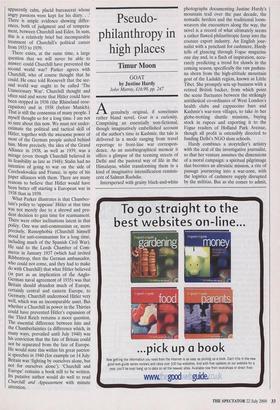Was his war really necessary?
John Lukacs
CHURCHILL AND APPEASEMENT by R. A. C Parker Macmillan, f20, pp. 290 History is revisionist. An 'orthodox' history, Maitland said, is a contradiction in terms. The law eschews multiple jeopardy; the historian may revisit — and re-try old subjects again. During the last decade we have seen all kinds of attempts to revise the historic portrait of Churchill, suggesting that he was short-sighted and blinded by his prejudices, that his statesmanship was inconsistent. Even before that we have seen many a revision of the long-accepted view that Appeasement, at least involving Ger- many and the 1930s, was short-sighted and immoral. Now we have at hand yet another book, Churchill and Appeasement, involving both themes. Is it a revision of revisionism?
It is not. This is a very valuable (and readable) book in which Alistair Parker does not 'pursue the obvious with the enthusiasm of a short-sighted detective', nor does he confect a novel thesis with the enthusiasm of a junior historian's appetite for publicity. Churchill and Appeasement is restrained and elegant, with a near- Olympian perspective. It concentrates on governmental and parliamentary politics, including a very thorough investigation of the parliamentary records for 1933 to 1939 relating to its theme. That theme goes beyond the well-known opposition between Churchill and Chamberlain and of their respective views; it focuses on the latter's decision to keep the former out of govern- ment even when — as many people began to think after March 1939 — Churchill's inclusion in a Chamberlain Cabinet could have been a salutary warning signal to Hitler. Chamberlain thought the opposite — a choice where more than personal ani- mosities were at work.
There is much new, or hitherto unre- marked, material in this book, including a statement by Attlee in the House of Com- mons in 1934, that Churchill is 'one of those brilliantly erratic geniuses who, when he sees clearly, sees very, very clearly'. This is telling, especially in view of their relations in 1940 but also because for years after 1934 Attlee and Churchill disagreed on many things. The pen-portraits are some- times delicious: Alexander Cadogan was 'an apparently calm, placid bureaucrat whose angry passions were kept for his diary...' There is ample evidence showing differ- ences, both of judgment and of tempera- ment, between Churchill and Eden. In sum, this is a relatively brief but incomparable treatment of Churchill's political career from 1933 to 1939.
There exists, at the same time, a large question that we will never be able to answer: could Churchill have prevented the second world war? Parker agrees with Churchill, who of course thought that he could. He once told Roosevelt that the sec- ond world war ought to be called 'The Unnecessary War'. Churchill thought and often said and wrote that Hitler could have been stopped in 1936 (the Rhineland reoc- cupation) and in 1938 (before Munich). That is still the consensus of many people. I myself thought so for a long time. I am not so sure about this now. We must not under- estimate the political and tactical skill of Hitler, together with the awesome power of most of the German people united behind him. More precisely, the idea of the Grand Alliance in 1938, as well as 1939, was a mirage (even though Churchill believed in its feasibility as late as 1948): Stalin had no intention of going to war on the side of Czechoslovakia and France, in spite of his paper alliances with them. There are many reasons to believe that Hitler would have been better off starting a European war in 1938 than in 1939.
What Parker illustrates is that Chamber- lain's policy to 'appease' Hitler at that time was not merely due to a shrewd and pru- dent decision to gain time for rearmament. There were other inclinations latent in that policy. One was anti-communism or, more precisely, Russophobia (Churchill himself stood for anti-communism for a long time, including much of the Spanish Civil War). He said to the Leeds Chamber of Com- merce in January 1937 (which had invited Ribbentrop, then the German ambassador, who could not come, and they had to make do with Churchill) that what Hitler believed On part as an implication of the Anglo- German naval agreement of 1935) was that Britain should abandon much of Europe, certainly central and eastern Europe, to Germany. Churchill understood Hitler very well, which was an incomparable asset. But whether a Churchill in power in the Thirties could have prevented Hitler's expansion of the Third Reich remains a moot question. The essential difference between him and the Chamberlainites (a difference which, in many ways, prevailed until July 1940) was his conviction that the fate of Britain could not be separated from the fate of Europe. He would state this within his great patriot- ic speeches in 1940 (for example on 14 July: Britain was 'fighting by ourselves alone, but not for ourselves alone'). 'Churchill and Europe' remains a book still to be written. Its putative author would do well to read Churchill and Appeasement with minute attention.



























































 Previous page
Previous page